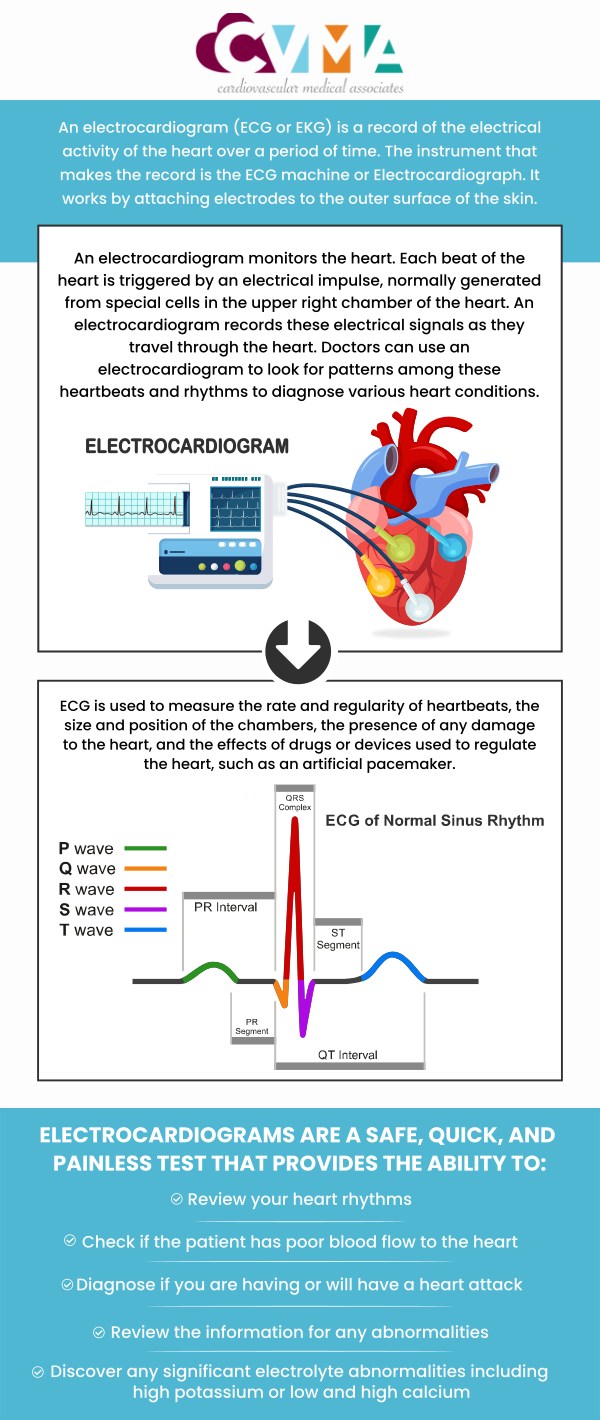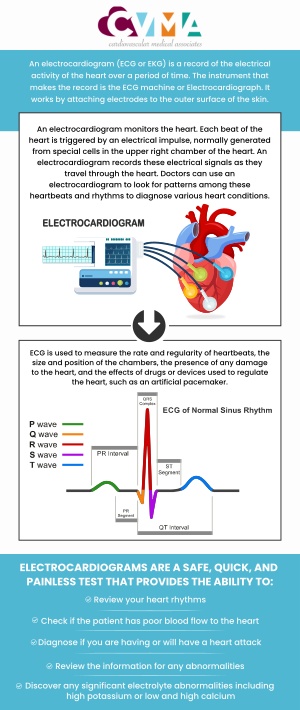Electrocardiograms at Cardiovascular Medical Associates in Downey, CA
An electrocardiogram (ECG or EKG) is a medical test that records the electrical activity of the heart. It helps diagnose heart conditions, monitor heart health, and guide treatment decisions. Quick, non-invasive, and essential for assessing heart function, an ECG provides valuable insights into heart rhythms and overall cardiovascular health. At Cardiovascular Medical Associates, Dr. Kaushal Tamboli, MD FACC, Paiboon Mahaisavariyra MA, Paul Yoshino MD, and our team, offer comprehensive electrocardiogram (ECG) services to assess heart health and diagnose conditions. To learn more or schedule an appointment, contact us today or book online. Visit us at 8317 Davis St, Downey, CA 90241.




Table of Contents:
What can be diagnosed with an electrocardiogram?
What is an electrocardiogram, and how long does it take?
Can an electrocardiogram detect all heart problems?
Does a normal echocardiogram mean my heart is fine?
Our experts are highly skilled in the interpretation of EKGs, which can reveal heart rhythm abnormalities, such as arrhythmias. These might present as tachycardia, bradycardia, or atrial fibrillation. Your EKG results can also help us diagnose coronary artery disease, heart attacks, heart failure, and cardiomyopathy—conditions that may directly impact the blood flow to or from your heart.
At Cardiovascular Medical Associates, we also use EKGs to diagnose other heart-related conditions like pericarditis, myocarditis, and valvular heart disease. This test even aids in the detection of congenital heart defects present at birth.
In addition to these conditions, an EKG is essential for diagnosing angina, a chest pain resulting from limited blood flow to the heart. It can also help us understand structural issues related to your heart, such as an enlarged heart or a thickened heart muscle, as well as electrolyte imbalances like high potassium levels that can impact your heart’s function.
In essence, an EKG test provides our expert team at Cardiovascular Medical Associates with detailed insights into your heart’s size, shape, and electrical axis, as well as its rate and rhythm. This powerful diagnostic tool plays a significant role in our ability to diagnose and treat a variety of heart conditions effectively, ensuring that you receive the most appropriate and timely care.
The EKG test is an integral part of our approach to heart health. During the procedure, we place up to 12 small electrodes on your chest, arms, legs, and occasionally other areas of your body. These electrodes are linked to an EKG machine that records the electrical activity of your heart onto a paper strip. This graphical representation is then reviewed by our highly trained healthcare professionals, who use it to detect any abnormalities in your heart’s functioning.
Despite its importance, an EKG is a relatively quick procedure that generally takes only 5 to 10 minutes to perform. The recording process itself takes only a few seconds, with the remainder of the time dedicated to our healthcare provider reviewing the recording and discussing the results with you. While the overall appointment may take longer due to these discussions and preparation, the time commitment for an EKG is minimal.
At Cardiovascular Medical Associates, we consider the EKG an essential tool in our mission to provide the best possible care for our patients. It allows us to detect, diagnose, and treat various heart conditions, such as arrhythmias, heart attacks, or heart failures.
Some conditions like coronary artery disease, heart failure, valvular heart disease, congenital heart defects, and myocarditis may not produce detectable abnormalities in an EKG reading. Also, some heart problems might not be noticeable during rest and only become apparent during physical activity.
Moreover, EKGs have certain limitations. They only capture a snapshot of the heart’s electrical activity, and thus intermittent heart problems may go undetected. Also, EKGs provide limited information about the heart’s size, shape, and functioning valves.
Importantly, a normal EKG reading does not necessarily rule out the presence of heart disease. Therefore, if heart disease is suspected, our experienced cardiologists at Cardiovascular Medical Associates may recommend a range of other tests, such as an echocardiogram, Holter monitor, stress test, or cardiac magnetic resonance imaging, for a comprehensive evaluation of your heart’s condition.
In conclusion, while an EKG is a valuable tool, it is not a definitive test for all heart conditions. We urge our patients to share openly about their symptoms, medical history, and potential risk factors for heart disease to ensure we can provide the most accurate diagnosis and appropriate treatment. If you have concerns about your heart health, please consult with our team at for a comprehensive evaluation and appropriate diagnostic tests.
Echocardiograms are a non-invasive imaging test that we use to provide a comprehensive image of your heart. This detailed depiction offers vital information about the structure and function of your heart, such as size, shape, and its capacity to pump blood.
A normal echocardiogram suggests that your heart is functioning well in several key areas:
● The heart is within normal size limits and has a typical shape.
● All heart valves are functioning correctly, promoting efficient blood flow.
● The heart’s chambers (atria and ventricles) are normal in size and shape, with satisfactory filling and emptying.
● The heart muscle walls have normal thickness and demonstrate no abnormalities.
● The heart contracts efficiently, ensuring effective blood circulation.
However, a normal echocardiogram does not necessarily mean your heart is entirely healthy. Diseases such as coronary artery disease, which often lead to heart attacks, might not be identified through an echocardiogram.
Echocardiograms might also not reveal issues with your heart’s electrical system, responsible for controlling the heartbeat. Conditions like arrhythmias might not be detected by this test. Results can sometimes be influenced by factors like body size and build, certain lung conditions, and even the skill and interpretation of the person conducting the test.
Even with normal echocardiogram results, it’s important to consider other factors like your overall health, family history, lifestyle choices, and any symptoms you’re experiencing. Regular visits to your cardiologist at Cardiovascular Medical Associates are key for tracking heart health and identifying potential concerns at an early stage.
Our medical professionals will interpret the echocardiogram results in conjunction with your medical history, physical exam findings, and other tests. We will discuss any abnormalities or concerns with you and suggest suitable follow-up steps.
In conclusion, while a normal echocardiogram can provide you and your doctor reassurance about certain aspects of your heart health, it does not provide a comprehensive picture. Regular heart check-ups and maintaining a healthy lifestyle are vital for long-term heart health. If you have any concerns or experience symptoms suggestive of heart problems, don’t hesitate to consult with our team at Cardiovascular Medical Associates for further evaluation. For more information or to schedule an appointment, contact us today or book online. We are conveniently located at 8317 Davis St, Downey, CA 90241. We also serve patients from Norwalk CA, Lynwood CA, Lakewood CA, Cerritos CA, Whittier CA, and surrounding areas.






